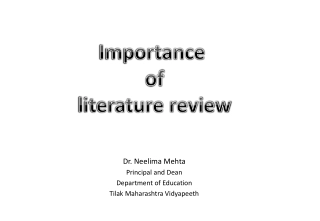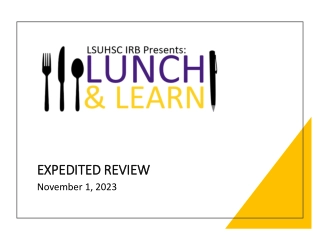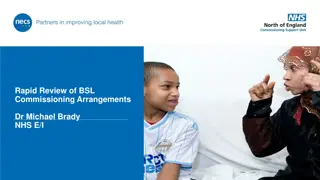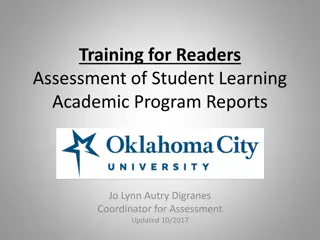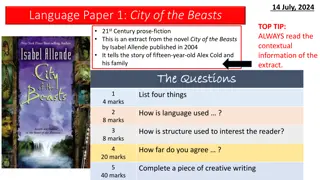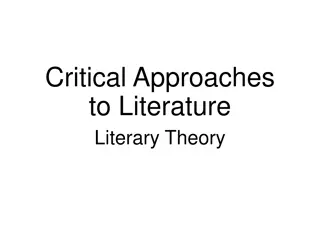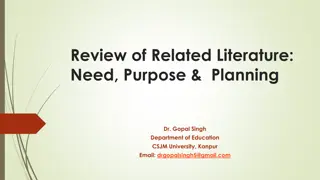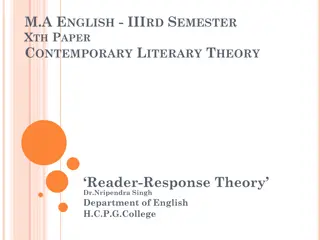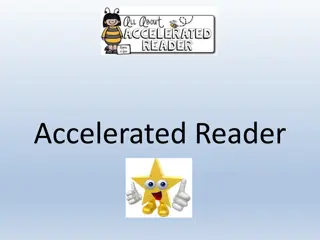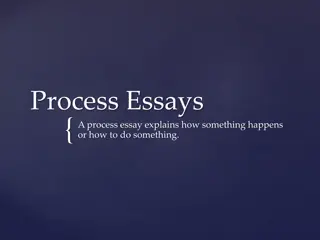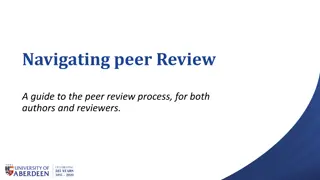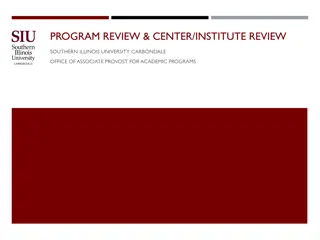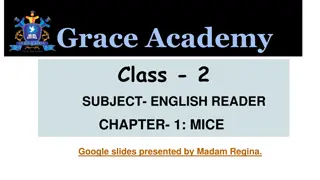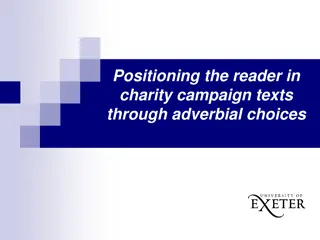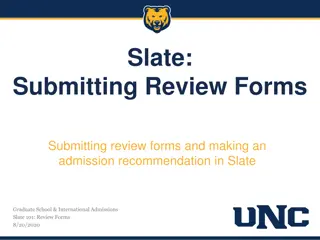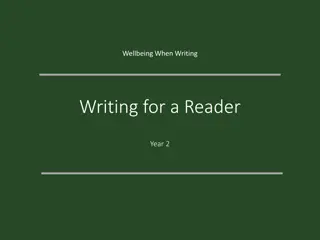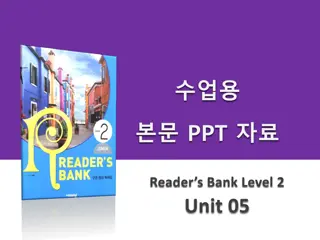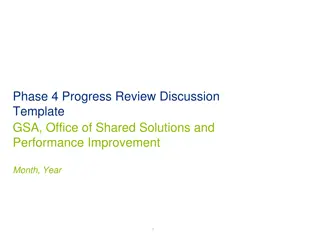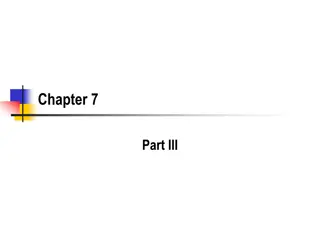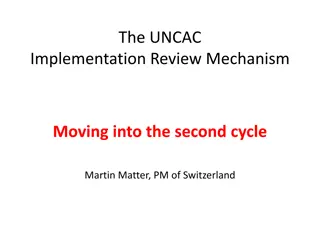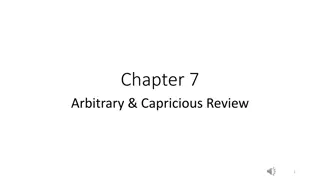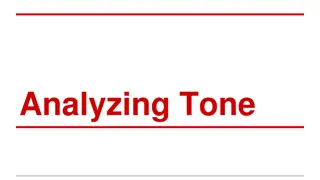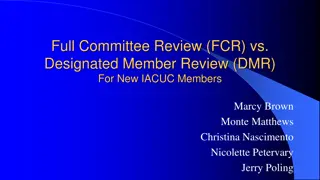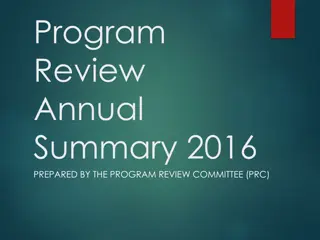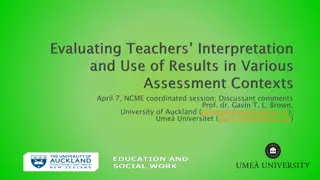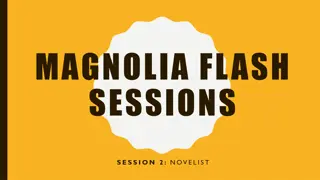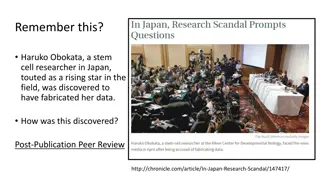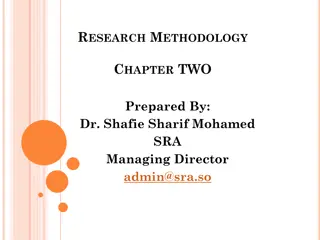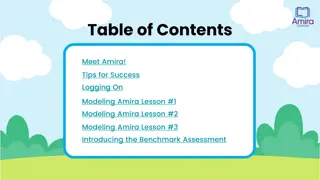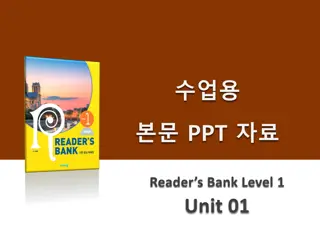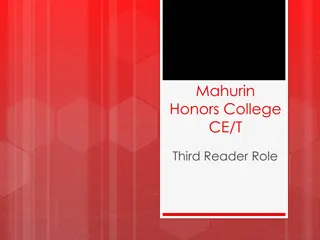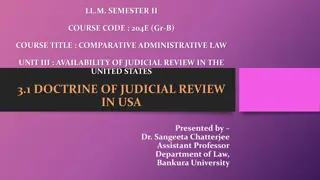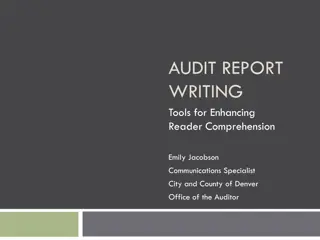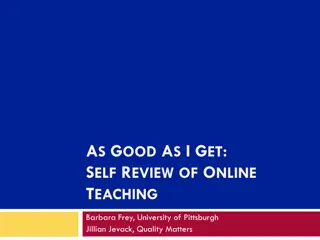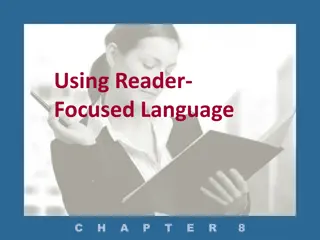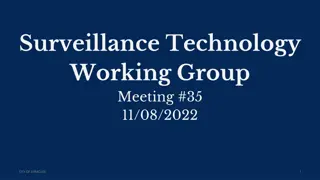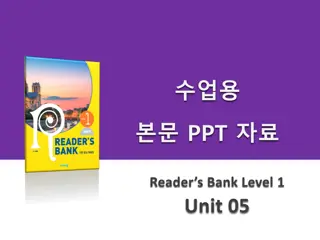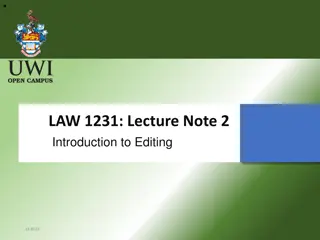Importance of literature review
A literature review is a critical component of any research endeavor, providing a comprehensive analysis of existing knowledge in a particular field. This review helps in clarifying conceptual issues, understanding research design, persuading examiners, and contributing new insights to the subject a
0 views • 28 slides
Understanding IRB Review Process for Expedited Research
Learn about the significance of IRB review, levels of review, and categories of expedited review. Discover the criteria for IRB review, including whether the study involves human subjects and contributes to generalizable knowledge. Explore the different levels of IRB review and the specific categori
4 views • 11 slides
Rapid Review of BSL Commissioning Arrangements by Dr. Michael Brady
NECS commissioned a Rapid Review of British Sign Language (BSL) service provision to identify areas for improvement in access and patient experience, especially during the Covid-19 pandemic. The review focused on stakeholder engagement, options appraisal for commissioning responsibility, and recomme
9 views • 19 slides
Understanding Reader Assessment for Student Learning Improvement
This presentation outlines the importance of assessment in student learning, covering topics such as the reader review process, student learning outcomes, evidence analysis, and stakeholder engagement. It emphasizes the systematic collection of information to inform decisions for enhancing learning
1 views • 28 slides
Analyzing Structural Features in "City of the Beasts
Explore the use of structural features in the novel "City of the Beasts" by Isabel Allende through an in-depth analysis of the text's organization and how it captivates readers. Understand how the writer shifts focus, introduces key elements, and maintains reader engagement. This analysis aims to un
0 views • 10 slides
Critical Approaches to Literature and Literary Theory
Explore different critical approaches to studying literature, including Reader-Response Criticism, Formalist Criticism, Psychological/Psychoanalytic Criticism, Sociological Criticism, and more. Dive into questions of how we read, interpret, and perceive meaning in texts, considering the impact of vi
1 views • 20 slides
Understanding Literature Reviews: Process, Purpose, and Types
A literature review is an essential part of academic research, providing a synthesis of existing studies on a topic. It involves reviewing published information within a specific subject area to help the reader understand the research background. The process of conducting a literature review is meti
0 views • 70 slides
Understanding Reader-Response Theory in Literary Criticism
Reader-response criticism in literary theory emphasizes the reader's role in interpreting and creating meaning from a literary work. This theory contrasts with approaches focusing solely on the author or text, highlighting the active engagement of readers in shaping the significance of a piece of li
1 views • 7 slides
Accelerated Reader Program Guide for Parents
The Accelerated Reader program is designed for children in Years 3 to 6 to find appropriate reading materials, encourage reading, and improve reading ability. Students take the STAR test at the beginning of the year to determine their ZPD score, which guides their book selection. Regular STAR tests
1 views • 7 slides
Mastering the Art of Process Essays
Explore the key components of writing an effective process essay, including the use of topic sentences, imperative mood, dividing the process into manageable steps, maintaining linear order, and utilizing transitional expressions to guide the reader through the process. Learn how to engage the reade
0 views • 9 slides
Navigating Peer Review: A Comprehensive Guide for Authors and Reviewers
In academic publishing, peer review plays a crucial role in maintaining publication quality. This guide offers a detailed overview of the peer review process for both authors and reviewers, covering topics such as receiving review invitations, manuscript submission, writing effective reviews, and mo
0 views • 31 slides
Southern Illinois University Carbondale Office of Associate Provost for Academic Programs Review
The Program Review & Center/Institute Review at Southern Illinois University Carbondale aims to educate attendees on IBHE requirements, the review process, conflict of interest policies, self-study writing, on-site review involvement, financial support, and available resources. The IBHE mandates rev
0 views • 37 slides
Exploring the Poem "MICE" by Rose Flyeman in English Reader Class 2 at Grace Academy
Dive into the English Reader chapter 1 at Grace Academy, where students learn about the poem "MICE" by Rose Flyeman. The presentation covers the difference between mice, rats, and mice with engaging visuals and a detailed explanation of the stanzas. Through this lesson, students explore the positive
0 views • 18 slides
Understanding Reader Response in Charity Campaign Texts
Explore the impact of adverbial choices in charity campaign texts like the RSPCA advert, analyzing how they shape reader perception and evoke emotional response. Discover the nuances of positioning readers through sentence structure and advocating for a cause effectively.
0 views • 8 slides
Slate Graduate School & International Admissions Review Forms Overview
Explore the process of submitting review forms and making admission recommendations in Slate Graduate School & International Admissions, including automatic assignment of applications to queues, review of Staff Review Forms, and recommending admission or denial through Faculty Review Forms. Learn ab
0 views • 8 slides
Enhancing Reader Engagement Through Effective Writing Strategies
Explore the significance of considering your reader when writing thesis chapters and evaluating the use of incluing to guide readers effectively. Discover techniques used in SF reading protocols to create engaging narratives and build immersive worlds through incluing, challenging readers to piece t
0 views • 11 slides
Interesting Stories from Reader's Bank Level 2 Unit 05
Explore intriguing stories from Reader's Bank Level 2 Unit 05, including mysteries of the night sky, a robotic dolphin, Hayao Miyazaki's love for airplanes, a surprising radio encounter, and Jack Ma's inspiring journey from adversity to success.
0 views • 7 slides
Phase 4 Progress Review Discussion Template Overview
This template guides a Progress Review discussion involving a Customer, Provider, and Key Stakeholders. It addresses the gaps in common business requirements, risk assessment confidence, deployment readiness, budget impacts, migration costs, and more. The template provides instructions for completin
0 views • 25 slides
Understanding Judicial Review in Administrative Law
In this chapter, the concept of judicial review in administrative law is explored, focusing on the scope of review set by Congress, including trial de novo and independent judgment on evidence. Different standards of review, such as clearly erroneous and substantial evidence, are discussed, highligh
0 views • 23 slides
UNCAC Implementation Review Mechanism: Moving Towards the Second Cycle
The UNCAC Implementation Review Mechanism is progressing into its second cycle, with a focus on evaluating challenges and terms of reference at the conclusion of each review cycle. The performance assessment has highlighted achievements in enhancing awareness and involvement of civil society/private
0 views • 7 slides
Understanding Arbitrary and Capricious Review in Administrative Law
Arbitrary and Capricious Review refers to a highly deferential standard applied to agency decisions, requiring agencies to demonstrate compliance with statutory requirements. The landmark case of Citizens to Preserve Overton Park v. Volpe set the precedent for a thorough judicial review based on the
0 views • 8 slides
Global Peer Review Activities and Future Plans Overview
This document highlights the recent peer review activities conducted by the Subcommittee on Peer Review, focusing on the accomplishments and upcoming plans for enhancing peer review processes. It includes insights from the Global Flyer Survey, training programs, and the development of guidelines, al
0 views • 3 slides
Understanding Tone and Mood in Literature
Tone refers to the author's attitude towards the subject, while mood is the emotional atmosphere of the text. The difference lies in how the author feels versus how the reader feels. Understanding and analyzing tone involves considering aspects like diction, imagery, figurative language, and syntax.
0 views • 14 slides
Understanding Full Committee Review (FCR) vs. Designated Member Review (DMR) for New IACUC Members
Explore the differences between Full Committee Review (FCR) and Designated Member Review (DMR) for new IACUC members. Learn the acceptable methods of protocol review, federal requirements, member responsibilities, risks, and best practices for protocol approval. Dive into the two valid methods of IA
1 views • 23 slides
Program Review Annual Summary 2016 by PRC Committee
The Program Review Annual Summary 2016, prepared by the Program Review Committee (PRC), presents a detailed review of instructional programs and administrative units at the College. The report outlines the purpose of the annual review, the themes and issues identified, and recommendations for improv
0 views • 13 slides
Enhancing Validity and Clarity in Assessment Reports through Reader Interpretation
Discussant comments by Prof. Gavin T. L. Brown focus on the importance of ensuring that assessment reports lead to correct interpretations by intended users. The validity of reports hinges on readers' ability to make appropriate inferences and actions based on the test taker's performance. By addres
0 views • 10 slides
Reader's Advisory Resource for Book Recommendations
Access a comprehensive reader's advisory tool featuring recommended reads for various age groups, browse books by genre and appeal, find read-alikes, and conduct advanced searches to discover new content and enhance reader advisor skills.
0 views • 9 slides
Uncovering Fabricated Data in Stem Cell Research: The Haruko Obokata Scandal
Haruko Obokata, a promising stem cell researcher in Japan, faced allegations of data fabrication, leading to a significant research scandal. Post-publication peer review platforms like PubPeer, PubMed Commons, F1000 Research, and ResearchGate Open Review play vital roles in detecting and addressing
0 views • 11 slides
Unraveling the Financial Crisis: A Weekend Reader's Guide
Delve into the financial crisis of 2007-2009 with "Getting Up to Speed on the Financial Crisis: A One-Weekend Reader's Guide" by Harrison Li. Explore the bankruptcy of Lehman Brothers, the triggers, vulnerabilities, and events that shaped the crisis. Understand the timeline, system vulnerabilities,
0 views • 32 slides
Effective Strategies for Conducting a Literature Review in Research Methodology
Understanding the importance of literature review in research methodology, this chapter discusses the objectives, aims, and guidelines for writing a comprehensive literature review. It emphasizes the significance of identifying gaps in existing knowledge, structuring the review, and organizing infor
0 views • 33 slides
Meet Amira - Engaging Online Reading Lessons
Dive into an exciting journey with Amira, a passionate reader eager to share her love for reading. Join her for interactive online modeling lessons, tips for success, and guidance through early reader skill development. Explore how to log on, practice reading aloud, and grow your vocabulary with Ami
0 views • 36 slides
Engaging Stories from Reader's Bank Level 1 - Unit 01
Explore captivating tales from Reader's Bank Level 1 Unit 01 where you'll encounter a range of topics such as colorful flowers with thorns, visits to the petting zoo, amazing animal instincts, the beauty of yodeling, climate changes affecting fruit growth, and social media's impact on shopping exper
0 views • 7 slides
Responsibilities of the Third Reader in Mahurin Honors College Capstone Defense
Serving as the third reader in the Mahurin Honors College Capstone Experience/Thesis Committee comes with the responsibility of ensuring fairness and facilitating a high-caliber defense for students. This role involves reviewing drafts, asking questions during defense, and leading discussions to det
0 views • 10 slides
Understanding the Doctrine of Judicial Review in the United States
Judicial Review is a crucial power of the judiciary to review the constitutionality of laws and executive orders. This article explores the origin of Judicial Review in the United States, focusing on the landmark case of Marbury v. Madison. It delves into the concept, importance, and application of
0 views • 14 slides
Enhancing Reader Comprehension in Audit Report Writing
Tools for improving reader comprehension in audit report writing, including deductive writing, economy of words, and descriptive headings. Learn the difference between inductive and deductive writing and how to make audit reports more engaging and informative. Practical examples provided.
0 views • 43 slides
Enhancing Online Teaching Through Self-Review: Challenges and Benefits
Explore the self-review process of online teaching, including identifying challenges, benefits, and different types of reviews. Learn about developing an effective review guide, promoting collegiality, and facilitating professional development in online teaching. Discover the components of a review
0 views • 23 slides
Enhancing Communication Skills Through Reader-Focused Language
Discover how to effectively use reader-focused language in communication by employing specific and clear language, choosing precise words, avoiding misplaced and dangling modifiers, and considering your readers' culture and language. Learn strategies to ensure your message is conveyed accurately and
0 views • 32 slides
Surveillance Technology Policy and Data Governance 2022 Review
The Surveillance Technology Policy and Data Governance 2022 Review outlines past decisions on various surveillance technologies, public comments, recommendations sent to the Mayor, and updates on the Automatic License Plate Reader (ALPR) technology and other monitoring systems in the City of Syracus
0 views • 18 slides
Fascinating Stories from Reader's Bank Level 1 Unit 05
Dive into the engaging tales from Reader's Bank Level 1 Unit 05, where you'll learn about dolphins hunting in groups, Maori nose-to-nose greetings, a heartwarming dog friendship, and the Ubuntu philosophy embraced by African kids. Discover unique cultural practices and heartwarming connections in th
0 views • 7 slides
Peer Review Process in Academic Editing
Explore the importance of peer review in academic and professional development, focusing on improving writing skills and critical evaluation. Learn about the benefits of peer review, ways to effectively review work, and various modes of assessment. Understand the peer review process and how it enhan
0 views • 29 slides
